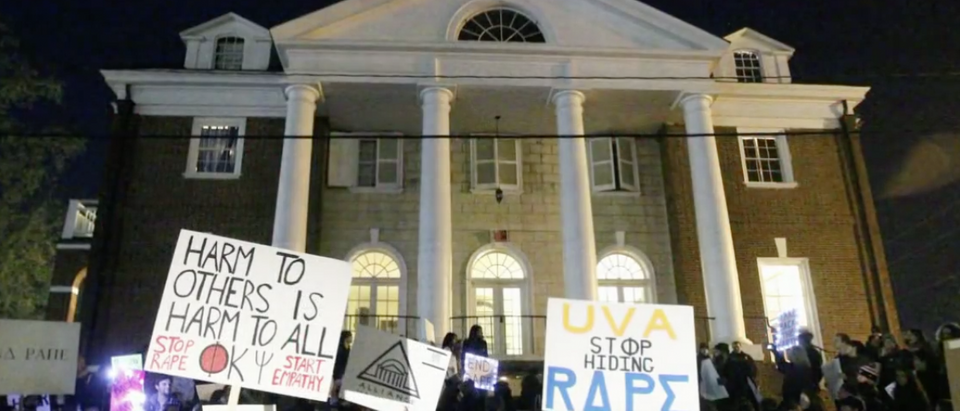A former White House college sexual assault task force member appears to have been gunning for a University of Virginia fraternity smeared in a Rolling Stone article about a now-debunked campus gang rape, newly released emails show.
“I want to see these guys gone and I want to keep it as legally sound as possible,” UVA alum Emily Renda wrote to Rolling Stone reporter Sabrina Rubin Erdely in July 2014, several months before the Rolling Stone article “A Rape on Campus” was published.
At the time, Renda was working in a gender-based violence prevention program at the school. That spring she had served on the White House Task Force to Protect Students from Sexual Assault. (RELATED: Emails Show The Moment That Rolling Stone Reporter Realized The Source Of Gang Rape Article Was A Liar)
Renda appeared concerned that publishing the name of the fraternity, Phi Kappa Psi, would “create a credibility issue” and hurt the effort to have it removed.
“I may need to urge you not to publish the name of the fraternity (phi kappa psi) in her case because we are trying to pursue ongoing action,” Renda wrote to Erdely, who is also a defendant in a lawsuit filed by UVA dean Nicole Eramo.
The email is included in court papers filed by the disgraced reporter on Friday. She cited the exchange to show that she relied on information about gang rapes from sources she believed to be truthful.
“There are two other young women with similar stories to Jackie who have not come forward fully yet and we are trying to persuade them to in order to get punitive action against the fraternity,” Renda continued, referring to Jackie Coakley, the former UVA student whose now-debunked Sept. 2012 gang rape is the main focus of Erdely’s article.
“If the article is published with her story in conjunction with the frat name before the other two girls come forward, it could appear that their stories are coached or false, which would create a credibility issue and take away our ability to kick off that frat. Does this make sense?”
“Please call me with questions — basically I just raise this issue because I want to see these guys gone and I want to keep it as legally sound as possible.”
Though Renda aggressively sought to oust Phi Kappa Psi, notes Erdely took during her reporting for the story show that the campus activist was aware of the two other gang rapes she mentioned in her email through Coakley.
She had not corroborated Coakley’s claims.
Under federal Title IX guidelines, action against fraternities can be taken with just two anonymous sexual violence claims. Renda and school deans hoped to use those anonymous claims — which came through Coakley — to remove the Greek organization.
Renda, who introduced Erdely to Coakley, had testified the month before her exchange with the reporter at a Senate hearing about campus sexual assault. During the hearing she cited Coakley’s story, though she referred to her friend as “Jenna.”
Renda stated that “Jenna” had been gang-raped by five UVA fraternity members. That conflicted with Coakley’s statement to Erdely that she had been raped by seven students.
Erdely knew of the discrepancy but appears to have done little to quiz Coakley about it.
Renda has largely avoided professional scrutiny since the publication of the article for her failure in judgement. (RELATED: Terry McAuliffe Appoints Activist At Center Of Rolling Stone Rape Article To Crime Commission)
In Dec. 2014, after the Rolling Stone article had been debunked, Virginia Gov. Terry McAuliffe appointed Renda to the state’s Criminal Sentencing Commission. She served as one of 17 people tasked with setting sentencing guidelines for felons.


